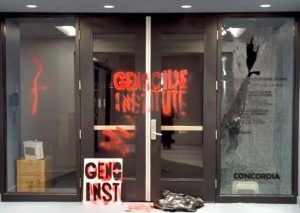A rabbi, an imam, a bishop and a Druze walk into the Metro Toronto Convention Centre. No, it’s not the beginning of a joke; it’s the Parliament of the World’s Religions, which ran from Nov. 1 to 7 in Toronto.
Israel’s delegation to the conference consisted of Rabbi Eliezer Weisz, representing the Chief Rabbinate Council, Sheik Mohammed Kewan, chair of the Association of Imams in Israel, Sheik Moafaq Tarif, spiritual leader of the Druze community in Israel and Bishop Giacinto Marcuzzo, auxiliary bishop of the Roman Catholic Patriarchate of Jerusalem.
The Parliament of the World’s Religions started 125 years ago in Chicago. It’s held every three to five years, usually in Europe or the United States. This year, there were over 6,000 registrants.
“People will see that leaders of all these major religions are all as one, coming together. I think it’s a lesson for the world,” said Rabbi Weisz. “We could live together in other countries. We live together and we have to speak out against all the terrible acts and atrocities and the destruction of whole communities that is happening. I think we are a flag, an example.”
The four religious leaders all spoke glowingly of the religious freedom afforded everyone in Israel. They all expressed that they are optimistic that the pros of religious life in Israel greatly outweigh the cons, and were adamant about sharing that truth with the world.
“For me, it’s very important to show that there is much more good than bad and that there are many more opportunities than challenges. This is why I think this is a very important opportunity for me to come forward and send this message,” said Imam Kewan through a translator.
READ: MUSLIMS FORM ‘RINGS OF PEACE’ AROUND TORONTO-AREA SHULS
About 10 years ago, the leaders of the various religious communities in Israel established a council. The council meets every year in a different religious community and also holds one or two special events each year.
One important job of the council is to work with schools to teach students about religious coexistence. The religious leaders see it as their duty to promote peace and do whatever they can to foster harmony between the communities.
“We respect every human being as a human being, as God’s creation. It’s his creation and we have to respect it. We are all children of God. We believe that we were all born in his image,” said Imam Kewan, who added that, “In terrorism, there is no God and there is no religion.”
The four men all strongly supported the recent “rings of peace” initiative, in which members of Toronto’s Muslim and Christian communities made circles in front of seven Toronto-area synagogues on the Saturday after the Pittsburgh shooting.
“We think this is a blessing to have these people of other faiths coming in solidarity and strongly condemn these acts,” said Sheik Tarif through a translator.
Sheik Tarif said he understands the tyranny of religious persecution, since the Druze community in Syria is oppressed, and therefore he understands the need to show solidarity between different religions and not just among one’s own.
He also stressed how the Druze community in Israel feels like an equal member of society.
“We feel that we have our share and our responsibility in handling the country and the country’s affairs. We have representatives in the government, in the parliament, in the IDF, in the police and so on and so forth,” he said.
Bishop Marcuzzo encourages anyone who visits Jerusalem to take a moment to watch the flow of people through the Jaffa Gate.
“The whole world passes there … Christians, Muslims, Jews, unbelievers even. All the pilgrims,” he said. The Jaffa Gate “is the theatre of Israel … the community, the common living, the common feeling of religions in Israel.”
Rabbi Weisz echoed the same sentiments.
“I’m here as a representative of the Chief Rabbinate Council, to say that we respect and admire all the other faiths in Israel,” he said. “We do our best and hope that they have all the privileges that they deserve. Total equality with the Jewish people who live in Israel. And that’s what we’re here for.”






